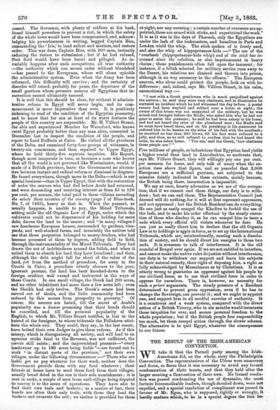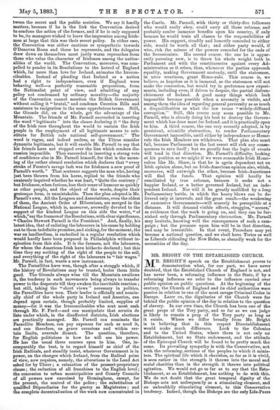THE RESULT OF THE IRISH-AMERICAN CONVENTION.
WE take it that the Parnell party among the Irish- Americans did, on the whole, carry the Philadelphia Convention. The representatives of the Ultras were numerous and fierce, so fierce that it was necessary to avoid any formal condemnation of their tenets, and that they held after the larger meeting a Convention of their own. No formal resolu- tion was passed condemning the use of dynamite, the most furious Irreconcileable leaders, though shouted down, were not expelled, and a special resolution of compliment was passed in favour of Mr. Egan, who is supposed, rightly or wrongly, it hardly matters which, to lee in a special degree the link be- tween the secret and the public societies. We say it hardly matters, because if he is the link the Convention desired to condone the action of the former, and if he is only supposed to be, its managers wished to leave the impression among Irish- men at large that this was their secret policy. In either case, the Convention was either cautious or sympathetic towards O'Donovan Roma and those he represents, and the delegates drew down on themselves most justly warm reproaches from those who value the character of Irishmen among the nation- alities of the world. The Convention, moreover, was com- pelled to pander in its Resolutions to the hatred of England which, far more than love for Ireland, animates the Irrecon- cileables. Instead of pleading that Ireland as a nation had a right to independence, even if England were behaving well—a perfectly reasonable proposition, from the Nationalist point of view, and admitting of any policy not condemned by ordinary morality—the majority of the Convention cannot mention the British Government without calling it "brutal," and condemn Coercion Bills and assistance to emigration in the same opprobrious terms. Still, the Gironde did, on the whole, get the advantage of the Mountain. The friends of Mr. Parnell succeeded in inserting the word " legitimate " into the clause declaring it "the duty of the Irish race throughout the world to sustain the Irish people in the employment of all legitimate means to sub- stitute for British rule national self-government." The word is vague, and indeed useless, as the Ultras consider dynamite legitimate, but it will enable Mr. Parnell to say that his friends have not stepped over the line which renders dis- cussion impossible. They succeeded in inserting a strong vote of confidence also in Mr. Parnell himself, for that is the mean- ing of the rather absurd resolution which declares that "every stroke of Forster's savage lash was for Irishmen a new proof of Parnell's worth." That sentence suggests the man who, having just been thrown from his horse, replied to the friends who anxiously inquired whether he was hurt, "Quits the contrary ;" but Irishmen, when furious, lose their sense of humour as quickly as other people, and the object of the words, despite their grotesque form, is unmistakable. Then the plan adopted is Mr. Parnell's own. All the Leagues and Associations, even the oldest of them, the Ancient Order of Hibernians, are merged in the National League, which is, moreover, avowedly devoted to the support of the kindred League on this side the water, "of which," say the framers of the Resolutions, with clear significance, "Charles Stewart Parnell is the President." And, finally, his latest idea, that of enlisting the labourers in his cause by holding out to them indefinite promises, and sinking, for the moment, the war on landlordism, is embodied in a regular resolution which would hardly have been proposed in Philadelphia without in- spiration from this aide. It is the farmers, not the labourers, for whom the American-Irish have hitherto declared ; but this time they say nothing of the right of the people to the soil, and everything of the right of the labourers to "fair wages." Mr. Parnell, in fact, wants a new instrument.
The Parnellites have won, though after a straggle which, if the history of Revolutions may be trusted, bodes them little good. The Gironde always wins till the Mountain swallows it, the tendency in such movements being always to transfer power to the desperate till they awaken the inevitable reaction ; but still, taking the "short views " necessary in politics, the Parnellites have won. Their leader is officially and nomin- ally chief of the whole party in Ireland and America, can depend upon certain, though probably limited, supplies of money—for it. was the Irreconcileables who sent most cash through Mr. P. Ford—and can manipulate that scrutin de Este under which, in the disaffected districts, Irish elections are practically managed. Mr. Parnell can nominate the Parnellite Members, can pay expenses for such as need it, and can therefore, on grave occasions and within cer- tain limits, overrule dissent. The question, therefore, for English politicians is how he will use his power. He has the usual three courses open to him. One, in- comparably the best, is to regard himself as chief of the Irish Radicals, and steadily insist, whatever Government is in power, on the changes which Ireland, from the Radical point of view, now requires, namely, the alterations in the Land Act asked for by Ulster ; a relaxation of the peasant-proprietary clause ; the reduction of all franchises to the English level ; the concession to urban municipalities and County Councils of all powers now exercised by Birmingham, except, for the present, the control of the police ; the substitution of qualified Stipendiaries for the gentry as Magistrates ; and the complete decentralisation of the work now concentrated in
the Castle. Mr. Parnell, with thirty or thirty-five followers who would really obey, could carry all those reforms, and probably confer immense benefits upon his country, if only because he would train all classes to the responsibilities of power. His support, steadily and honestly conceded to either side, would be worth all that ; and either party would, if wise, risk the misuse of the powers conceded for the ends of tho Secessionists. His second course, the one he is appar- ently pursuing now, is to throw his whole weight both in Parliament and with the constituencies against every Ad- ministration as it arises, thus, whenever the parties approach equality, making Government unsteady, until the statesmen, in utter weariness, grant Home-rule. This course is, we believe, as hopeless as it is immoral, as the statesmen will not make the concession, but would try in preference new experi- ments, including even, if driven to despair, the partial disfran- chisement of Ireland. A good many things which look impossible become possible when a necessity is visible, and among them the idea of regarding general perversity as as much a disqualification as what the law terms "widely-diffused corruption." Still, this course may seem possible to Mr. Parnell, who is already doing his best to destroy the Govern- ment which has done most for Ireland, and it is practically open to him. A third course, the one very recently adopted, is by persistent, scientific obstruction, to render Parliamentary Government impossible, until either by independence or Home- rule the Irish Members are withdrawn. That plan also must fail, because Parliament in the last resort will risk any conse- quences to save itself ; but we greatly fear the logic of events will tend in that direction. Mr. Parnell's difficulty, looking at his position as we might if we were reasonable Irish Home- rulers like Mr. Shaw, is that he is again dependent not on Irish opinion alone, but on Irish-American opinion also, which, moreover, will outweigh the other, because Irish-Americans will find the funds. That opinion will hardly be conciliated by true reforms, because it seeks not a happier Ireland, or a better governed Ireland, but an inde- pendent Ireland. Nor will it be greatly mollified by a long Parliamentary battle, in which the heavy blows can be de- livered only at intervals, and the great result—the weakening of successive Governments—will scarcely be perceptible at a distance. It will demand visible effects, struggles, "scenes," as evidences that the work is going on, and they can be fur- nished only through Parliamentary obstruction. Mr. Parnell
may hesitate, knowing well the consequences of such a cam- paign ; but the pressure upon him will be in that direction; and may be irresistible. In that event. Procedure may yet become a national question, and we shall have Tories as well as Liberals ridiculing the New Rules, as absurdly weak for the necessities of the day.



































 Previous page
Previous page